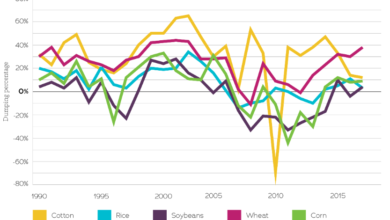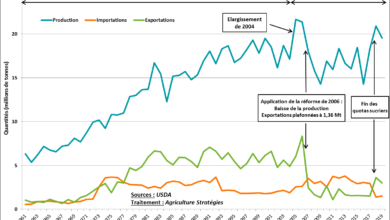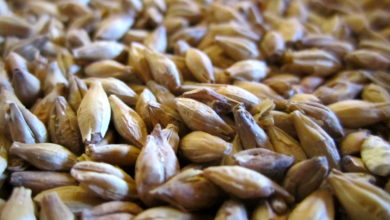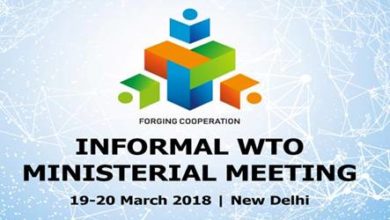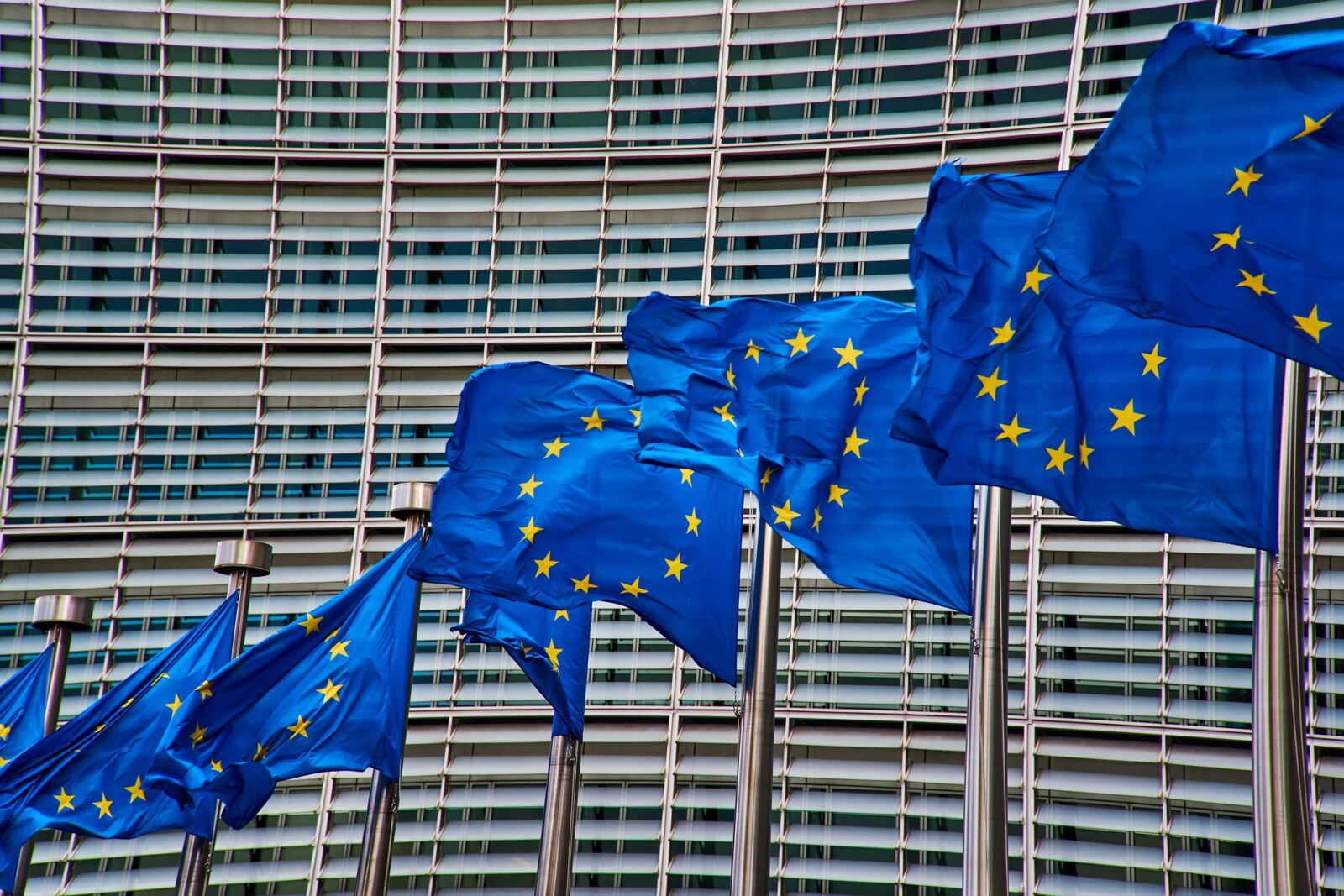
Download the PDF
The European Union communicated on February 18 on the review of its trade policy[1]. The Commission explains how to implement the concept of open strategic autonomy, which must be carried out considering environmental objectives (Green Deal, compliance with the Paris agreements). However, if the EU continues to defend multilateralism, counting on the resurrection of the WTO to define new multilateral agreements and to enforce them, its posture about the agricultural rules of the WTO – source of the blockage of the cycle of Doha – does not show any evolution: autism or negotiation strategy? Advancing a new principle that “imports must comply with relevant EU regulations and standards”, this communication comes at the best moment when the CAP negotiations are dealing with amendments relating to the conformity of imports to our standards or to the establishment of a centralized system to activate the safeguard clauses in the event of excessive imports.
Autonomous tools to defend the strategic interests of the EU
“An open, sustainable and assertive trade policy”. The communication details the open strategic autonomy project, defined as “ the EU’s ability to make its own choices and shape the world around it through leadership and engagement, reflecting its strategic interests and values”. In this new trade strategy, Europe wants to be the driving force of the renewal of multilateral trade relations, where it wants to be able to impose its rules. Advocate openness, cooperation and multilateralism while preserving its strategic interests … Can Europe benefit from liberalism without suffering the consequences?
The firmness of the discourse is reflected from the first pages: the concept of open strategy autonomy implies in particular ” assertiveness and rules-based cooperation to showcase the EU’s preference for international cooperation and dialogue, but also its readiness to combat unfair practices and use autonomous tools to pursue its interests where needed. “
We can notice that it yet exists some tools already designed to protect the EU and its producers, in particular the safeguard clauses negotiated within free trade agreements. These clauses aim to temporarily impose tariff and quotas on certain products (temporary withdrawal of tariff preferences) in the event of excessive imports disrupting markets. However, just like the crisis reserve in the CAP, this tool is never really used in agriculture, due to a lack of political will on the part of the Commission and lack of an effective monitoring markets system. Will the recent inclusion of safeguard clauses in a common horizontal regulation[2] be sufficient to facilitate their application?
Anyway, the communication goes further and announces a desire to protect the internal market from imports that do not meet European standards. The Commission argues that the rules of world trade already allow it to regulate “in line with their societal preferences“, which leaves some doubts. The speech is however crystal clear: “Imports must comply with relevant EU regulations and standards. (…) The legitimacy of applying production requirements to imports is based on the need to protect the global environment or to respond to ethical concerns. Whenever the EU considers applying such measures to imported products, this will be done in full respect of WTO rules”.
There was already a form of health protection of the European market against foods that could “constitute a serious risk to human health, animal health or the environment”. Articles 53 and 54 of the European regulation of 28 January 2002[3] allow the application of an interim measure which makes it possible to limit or prohibit the import of these dangerous foodstuffs. We can also note that France, then followed by other European countries, has already requested the application of these articles, and is implementing an interim measure prohibiting the import of cherries treated with dimethoate, every year since 2016.
The communication now plans to go further by no longer considering the health hazard but European standards as a reason for restricting imports. Will the protection of the internal market regarding European standards be more effective than the existing protection regarding excessive imports? We can only hope so, despite the French example on the subject. The national regulations which make it possible to prohibit the importation of foodstuffs for which use has been made of products or food not authorized by European regulations (article 44 of the Egalim law) has in fact never been implemented.
Resuscitate the WTO by greening its objectives
For the Commission, the revival of multilateralism necessarily requires the revival of the WTO, which will be made possible by the revision of its objectives. The appointment of the Nigerian Ngozi Okonjo-Iweala at the head of the organization, the arrival of a new American administration more open to negotiation form for the EU the signal of a new beginning for the WTO, and it wants to put all it weight behind. In the documents presented in the annex to the communication, the Commission largely reviews the role of the WTO, explains that its rebirth is necessary for several reasons:
- Achieve the acceptance of multilateral agreements which enforce common rules shared by all in terms of trade, unlike bilateral agreements which generate a form of favouritism between States and make it more difficult for other Nations to access their markets.
- Rehabilitate the Dispute Settlement Body to rule in the event of non-respect of these rights. For the EU, this institution makes it possible to ensure that the rules are respected by all, and should make it possible to avoid an increase in tariff in the event of a food shortage, which can further destabilize the markets (although the WTO proved powerless to curb this phenomenon in 2007).
The reasons for the blocking of the WTO have deep roots, as we detailed in our note: “For a reform of multilateralism: a challenge for the European institutions and a solution for the CAP” and in several articles[4],[5],[6]. Developed countries and in particular the EU wish to keep the head start obtained through the authorization to support their agriculture by respecting an advantageous aid ceiling (established on a high historical reference), while the developing countries, stung by the food crisis of 2007/20008, wish to protect their agriculture, via tariff and public storage measures, and claim the possibility of also supporting their agriculture by direct aid. And yet, the Commission has its own way of explaining the reasons for the blocking of the Doha Round: for it, the advantages granted to emerging economies based on the principle of the most favoured nation (MFN) which have continued with time without considering the evolution of economies form the heart of the matter. Thus, China is used as a scapegoat, cited as an example of those countries which can therefore export easily while benefiting from lower import taxes (” The level at which China has opened its markets does not correspond to its weight in the global economy”).
The debates on internal support for agriculture and storage policies are not even listed as a reason for blocking in this Commission document, although the subject has nevertheless been widely discussed in political and scientific forums and constitutes a central stumbling block in the negotiations[7]. The Commission is blandly positioned on the subject as it has always done, arguing that since it itself played the good students, the others just have to follow: “Commitments on domestic support in the agriculture sector should be the priority of negotiations, considering the proliferation of trade distorting policies and measures.. […] Looking forward, the EU is in favour of a substantial reduction in trade-distorting domestic support. [ which prevents it from reducing its decoupled aid which is not classified in this category]. The EU has reformed its agricultural policy over the last 30 years, moving away from trade-distorting to non-trade-distorting support. Other WTO members have yet to undertake similar reforms. “
For the Commission, the solution to resuscitate the WTO, which has been at a standstill since 2008, is therefore not to work on compromises on the historical reasons for its blockage, but rather to find a new purpose, through the definition of a new common objective tinged with green: ” economic recovery and development, free from competitive distortions, as well as environmental and social sustainability as part of the green transition of economies “. Like the Greenwashing of the CAP, will repainting the WTO in green make it possible to federate States through new common commitments?
Recourse to the WTO to defend the application of the Green Deal?
The rehabilitation of the WTO through environmental objectives as desired by the EU would come at a very opportune time for the defence of the environmental objectives set by the Green Deal. Respect for the Paris agreements, carbon offsetting at the borders… The EU argues thus on the possibility that the WTO leaves open to the Nation States to protect the environment and the climate: “Contrary to fears expressed when the WTO was created, no country has been forced to lower its desired level of health or environmental protection because of a ruling of the WTO dispute settlement system. Going forward, the EU will support in international discussions on trade and environment issues an interpretation of relevant WTO provisions that recognise the right of Members to provide effective responses to global environmental challenges, notably climate change and the protection of biodiversity “. Like the green box in agriculture, all measures relating to the protection of the environment, climate or biodiversity could therefore be tolerated. While it does not reconsider its position on agricultural support or storage policy according to developing countries demands, the EU therefore hopes that WTO member countries will accept what some call a new form of protectionism…
The main document thus provides for the creation of a ” a new legal instrument in the area of trade policy, to protect the EU from potential coercive actions of third countries” as well as “a legal instrument to address distortions caused by foreign subsidies on the EU’s internal market”. The EU could thus prepare to protect various sensitive sectors including agriculture, and hope for the rehabilitation of the WTO and the Dispute Settlement Body to defend the application of this new arsenal.
The reform of the current CAP therefore appears to be closely linked to this revision of trade policy. Will the Article 188 bis proposed by the European Parliament for the reform of the CAP (which aims to refuse or tax imports of agricultural products that do not meet the health and environmental requirements of the EU) be part of this news measures announced by the Commission? The amendment to Article 182 also requested by Parliament would also give the possibility of improving the system of additional import duties to have a more appropriate safeguard mechanism in addition to the safeguard clauses relating to bilateral agreements. Putting these tools in the CAP regulations would allow better consistency with the new positions of the Directorate-General for Trade. In the document relating the state of negotiations on January 13, 2021[8], amendments 134 and 138 that we have just mentioned were categorized as “to be considered” by the Council, therefore neither rejected out of hand nor validated. At the end of the following discussion, on January 18[9] , these articles were classified as “to be considered to the extent that it’s in line with WTO rules”. They do not appear in the four-column document which summarizes the state of the current compromises following the first two trialogues[10]. Suspense remains…
Wishful thinking or beginning of a new deal in the fight against unfair competition? If these principles were to be effectively implemented, if the WTO would be reborn from its ashes with a new trade defence mission for our more environmentally friendly products, this upheaval could then work in favour of the protection of European farmers, that the current CAP no longer allows. Could the WTO, which has been the gravedigger of guaranteed prices and which has put European farmers at the mercy of market instability, then manage to redeem itself? But, at this point, these prospects are arguably unrealistic optimism, since disagreements among WTO members are deep-rooted. The recent example of India, which tried to revise its guaranteed price policy to take a step forward towards reopening negotiations, an attempt fortunately suspended for the time being, shows that food sovereignty remains a jealously guarded national prerogative. While the EU wants to intensify dialogue with China and India, is it credible to do not offer anything in food security? To make its views acceptable and protect the orientations resulting from the Green Deal, Europe could nevertheless have to consider certain concessions. If it succeeds, this revision of trade policy could thus have an impact on agriculture, while the CAP seems to be restricted more and more to a distribution of budgetary envelopes defined to best satisfy each Member State.
Alessandra Kirsch, Director of studies of Agriculture Stratégies
March 22, 2021
[1] https://trade.ec.europa.eu/doclib/press/index.cfm?id=2243
[2] https://eur-lex.europa.eu/legal-content/EN/TXT/HTML/?uri=CELEX:32019R0287&from=EN
[3] https://eur-lex.europa.eu/legal-content/EN/TXT/HTML/?uri=CELEX:32002R0178&from=EN
[4] https://www.agriculture-strategies.eu/en/2019/12/the-wto-is-dead-long-live-agricultural-multilateralism/
[5] https://www.agriculture-strategies.eu/en/2018/09/reforming-the-wto-to-overcome-the-crisis-of-multilateralism/
[6] https://www.agriculture-strategies.eu/en/2018/07/will-spanish-ripe-olives-puncture-the-pac/
[7] http://capreform.eu/prospects-for-progress-on-the-wto-agricultural-agenda/
[8] https://data.consilium.europa.eu/doc/document/ST-14224-2020-REV-1/en/pdf
[9] https://data.consilium.europa.eu/doc/document/ST-14224-2020-REV-2/en/pdf
[10] https://data.consilium.europa.eu/doc/document/ST-6045-2021-INIT/en/pdf








